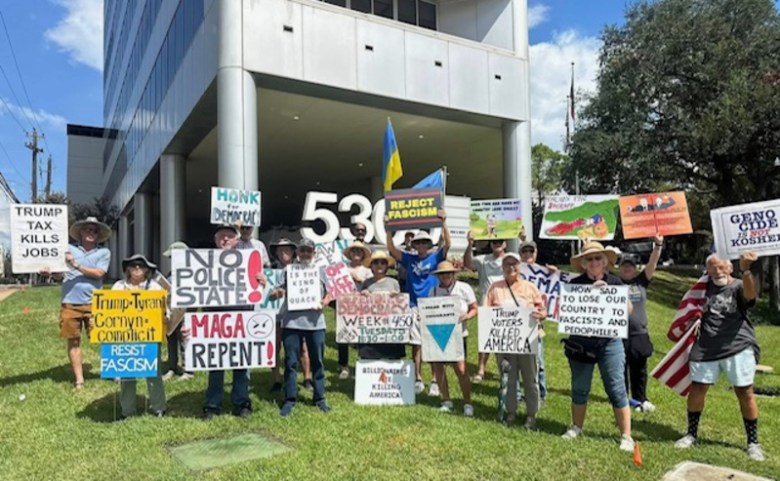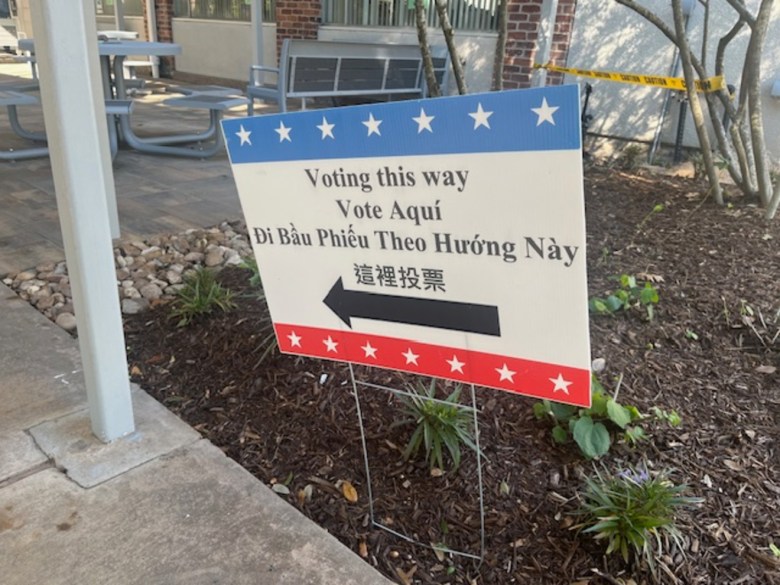Affordable Healthcare Hangs in the Balance in Federal Government Shutdown
Before the federal government shutdown announced last week, the most recent halt in services — also under a Donald Trump administration — lasted 35 days, and the current political climate is much more acrimonious than it was seven years ago, signaling things may get worse before they get better, a Houston economist says.
“We seem to be in a more adversarial world today,” said University of Houston economics professor Vikram Maheshri. “I don’t think we’ve gotten better at getting along today than we were in 2018. I’m not saying everything was amazing then, but we’ve gotten worse at making compromises. If I were going to be a political prognosticator, I’d say I think it’s going to last for a while.”
“This doesn’t strike me as a brief disagreement because it seems to me that both parties think they have something to gain from this,” he added. “In any sort of negotiation or mediation, if both parties think they have something to gain from not agreeing or not compromising, then it’s really hard to do that. My sense is that it’s not going to make either side more popular.”
The latest stoppage was announced October 1 after the U.S. Congress failed to reach a funding agreement for its governmental agencies. Republicans and Democrats are blaming each other, with Dems saying they want to negotiate lower healthcare premiums and the GOP lamenting a failed “continuing resolution” that would have extended funding through late November and avoided the shutdown, at least temporarily.
When the government shut down from December 2018 to January 2019, it caused service delays and temporary financial setbacks for federal employees, but some people, especially those who didn’t work for a government agency, may not have experienced a huge impact, Maheshri says.
A government shutdown occurs because federal institutions like the U.S. military, Environmental Protection Agency, and Veterans Administration lack the legal authority to spend money without an approved budget. So for the government to reopen, Congress has to pass legislation that provides funding for the agencies that have been halted.
The U.S. House passed a continuing resolution that would have extended funding for seven weeks, but the measure failed in the Senate in a 44-48 vote. Most Texas Republicans supported the extension; Democrats voted against it, saying they wanted to negotiate on preserving health care subsidies that expire at the end of the year.
Senate Republicans need 60 votes to pass a spending bill through the upper chamber.
Social Security, Medicare, and Medicaid are funded separately from other Congress-funded programs and are generally unaffected by government shutdowns, Maheshri says. However, benefit administration could be delayed if workers are furloughed or call in sick.
John Diamond, a financial policy expert at Rice University’s Baker Institute for Public Policy, says he expects federal employees will be furloughed, some public services will be disrupted, and payments to essential workers and government contractors will be delayed.
Although Diamond says he doesn’t know how long the D.C. standoff will last, he estimated it would extend “maybe another week or two.”
“Everything depends on how long it lasts,” Diamond said. “If it ends today, the average Houstonian would be completely unimpacted. If it continues on for a month, the average Houstonian probably won’t notice and they would only notice if they were a federal employee, if they had contracts with the federal government, or if they live in an area that is highly concentrated with federal services and they provide some service to those employees.”
At its onset, the shutdown will be more costly for certain people, and the costs will increase over time, Maheshri says. The process of closing on a new home could be delayed because the buyer can’t get flood insurance through a national program, and a person planning international travel and waiting on a passport will have to cancel their plans, the professor says.
“So for a few people, in these specific kinds of situations, it’s going to be extremely costly, but for most people it might not be such a big deal,” he said. “And then, after a week or two, employees who are counting on paychecks and are basically just getting IOUs, that might start to get costly. This includes the majority of military people and government contractors. And then it will get broader and broader.”
An air traffic controller who is getting paid in IOUs might take days off to try and make money another way, Maheshri added.
“The response to that is not going to be to fly the same number of planes and just have crashes,” he said. “It’s going to be that airlines are going to fly fewer and fewer flights. The longer it goes, the more people are going to be affected by it. And I think more people will be affected more acutely. We all interact with the federal government in some way or another. Eventually it’s going to affect all of us.”
The EPA reported last week that about 90 percent of its workforce will be furloughed during the shutdown. This could be a devastating blow to the agency responsible for overseeing toxic pollution and cleaning up contaminated sites like the cancer cluster at Harris County’s San Jacinto River. It also gives Trump leeway to pursue layoffs and dismantle institutions that his political adversaries support, critics say.
The Department of Homeland Security has said it plans to keep the vast majority of its Immigration and Customs Enforcement on the job, so raids on Houston laborers aren’t expected to slow down.

Neil Aquino, founder of the Houston Democracy Project, protests outside of U.S. Sen. John Cornyn’s office once a week and opposes Trump’s policies on immigration but said he hasn’t gotten involved in any organized effort to speak out on the government shutdown.
“It’s all a stream of lousy news, and I don’t know that people differentiate it from the other lousy news,” he said. “You’re really just trying to manage trauma, and here’s one more, essentially, assault by [Republicans] who have made it clear they want to hurt us. So they’re going after these agencies because they think it will inflict hurt rather than it being about public policy.”
Jobs and funding have already been cut at the Texas Medical Center, NASA, National Weather Service and FEMA, with little action at the local level to stand up to Trump, Aquino said.
Although President Trump has threatened to dismantle FEMA after this hurricane season, shifting the burden of natural disaster response to states, the Department of Homeland Security indicated most of its emergency management officials are considered essential and will continue working through the shutdown.
Diamond says that in the short term, only government workers and people planning trips will be affected, but the big picture is that fiscal reform is needed at the federal level.
“The indirect effects are, to the extent that this lasts long enough and this nudges the [Gross Domestic Product] down enough, if we’re in an economy that’s very weak and this causes the economy to flip into a recession, then the average citizen may feel that,” he said.
Healthcare Debate
The future of enhanced premium tax credits under the Affordable Care Act is at the core of the shutdown negotiations. The measure, first approved in 2020, allows households above 400 percent of the federal poverty line to become eligible for tax credits, and it lowers the percentage of income households are expected to contribute, Diamond says. The federal poverty line for a family of four is $31,200.
“Obviously, reducing subsidies for premium tax credits would increase the costs that households are required to pay, but extending the credits will increase spending through the tax code and the deficit,” Diamond said. “The Committee for a Responsible Federal Budget estimates that an extension for 10 years would cost $300 [billion] to $400 billion, depending on how broad the subsidy eligibility is.”
The credits were approved during the COVID-19 pandemic and extended by the Inflation Reduction Act in 2022. Democrats want to make them permanent to prevent rising premiums, and Republicans say they were only intended to be in place temporarily.
A likely scenario to end the shutdown would be that a few Democrats switch their votes, and if that happens, there may be a negotiation scenario in which the Republicans agree to reconsider tax credits at the end of the year. But something has to give, Diamond says.
When COVID hit in 2020, people lost jobs, income, and health insurance. The government responded by providing temporary relief, but it can’t go on subsidizing health insurance forever, particularly while the country’s debt is in the trillions, Diamond says.
“Here’s the thing about federal programs. Once people have them, it’s very hard to take them away,” he said. “Once a benefit is on the books, the political pain of taking it away often outweighs the cost of keeping it.”
“It’s a symptom of America’s broken budget process,” he added. “Instead of deliberate long-term planning, we get crisis-driven policymaking where programs are born in emergencies, patched through short-term extensions, and eventually calcify into permanent spending.”
Democrats appear to genuinely want their constituents to be able to access affordable healthcare, and some Republicans want that, too, Maheshri says.
“It seems like a lot of Democrats are worried about being perceived as, ‘We’re not fighters. We’re rolling over.’ You have to do some symbolic stuff to show that you’re a fighter,” he said. “If you’re a little kid in the lunchroom and you want to not get picked on, you might pick a fight with someone stronger than you even though it’s not going to go so well for you. It could change the perception.”
“I think on the Republican side, one thing that’s different about this shutdown versus any others that I can think of over the last 10 or 15 years, I feel like the administration is trying to use this as a way to kind of punish people that it doesn’t like or restrict money to blue states or use this opportunity to reduce the size of government.”
Diamond says historically during a standoff, the party seeking the policy change has almost always lost.
“The party that just wants a clean resolution usually wins,” he said. “My hunch is that eventually the Democrats will have to abandon this political ploy and move on to a continuing resolution. The Democrats don’t have the votes. You can’t force it to pass now by holding the government hostage.”
Federal Workers Won’t Be Paid
In the meantime, thousands of Texas workers will go to their jobs knowing they won’t get a paycheck right away.
Transportation Security Administration employees at George Bush Intercontinental Airport were among those essential employees expected to show up despite the shutdown, an airport employee told The Houston Press last week. They’re guaranteed back pay once the funding is restored — the IOUs professor Maheshri mentioned — but there will undoubtedly be a stall in service.
VA hospital providers, active-duty service members and most civilian personnel at military installations are also expected to work without pay. The economy and labor market have softened lately, and a shutdown isn’t going to help, Maheshri says.
“It’s not like we’re in a really robust place right now, economically,” he said. “Imagine if everyone has to skip a paycheck. We’re not going to go to as many restaurants. We’re not going to buy as much stuff, and we’re not going to do as much stuff. If things were going really strongly in the economy, it might not be that much of a concern but if things are a bit more fragile, it’s not going to help.”

Texas AFL-CIO president Rick Levy says the shutdown will lock out hundreds of thousands of federal employees from doing their jobs while forcing hundreds of thousands more — like TSA officers, VA caregivers, and border patrol agents — to work without pay.
“That reduces access to services and pulls billions out of local economies,” Levy said in a press release. “Trump and his billionaire buddies have taken our government hostage until their demands are met — and Texas families will pay the price.”
Financial Pressure
Those who rely on government benefits like the Supplemental Nutrition Assistance Program and the WIC food and immunization program for postpartum mothers and children can still use their debit cards and attend appointments, but that could change if the shutdown extends for a long period of time, government officials have said.
It’s a recurring theme since Trump took office, Aquino says. The policies hurt the lower- and middle-class residents while the rich stay wealthy.
Diamond says a takeaway from the current situation is that the government shouldn’t pass an extension or increase on a temporary basis because people expect it to be permanent.
“That goes for tax cuts and spending,” he said. “We saw that in July with the Republicans’ tax cuts, claiming that temporary tax cuts were really meant to be permanent. Now we’re seeing it with Democrats on the spending side. If we continue like this we will be bankrupt. You can’t increase spending and always reduce taxes. Those two things never work out well in the end.”
If the health insurance premiums are extended, something has to be cut or an additional revenue stream must be identified, he added.
“My suggestion would be to broaden the tax base,” he said. “It involves cutting spending or raising taxes. The problem is it’s very hard to get everybody to agree politically on which route you should take.”
Maheshri agreed that the big fiscal picture for the United States is “not great.”
“We have a lot of debt,” he said. “Our debt is bigger than our [Gross Domestic Product], and it’s growing. We’re not moving in the right direction. This is not to say you should have zero debt. You have to do one of two things. The government has to spend less or make more. In all likelihood, it’s going to take some combination of both.”
This article appears in Jan 1 – Dec 31, 2025.
Related

Reign Bowers is an outdoor enthusiast, adventure seeker, and storyteller passionate about exploring nature’s wonders. As the creator of SuperheroineLinks.com, Reign shares inspiring stories, practical tips, and expert insights to empower others—especially women—to embrace the great outdoors with confidence.




Post Comment